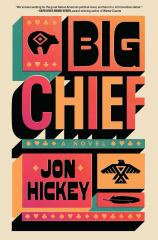Big Chief
Review
Big Chief
Jon Hickey’s BIG CHIEF, a debut novel that takes place on a Wisconsin tribal reservation, is entertaining and thoughtfully presented. It might even take your mind off of the daily pounding of “breaking news” and political punditry that bombards us hour after hour.
The election chronicled here is not of national significance. It involves only about 3,000 citizens choosing the tribal president of the fictional Passage Rouge Nation. But for Mitch Caddo, a young attorney who serves as a legal and political advisor to Mack Beck, the current officeholder seeking reelection, it is a consequential contest. Mack’s term has been rocky, and his opponent is vigorously exposing every one of those rocks in her effort to win the office that controls life for the tribal members and the operations of a major enterprise, the Golden Eagle Casino and Hotel, that produces an annual net revenue of $25 million for the tribe.
"At its heart, BIG CHIEF is a rousing story about the problems of belonging to a family and a community, and how ambition and power can impact life choices."
Hickey was born in Mankato, Minnesota. He grew up there, as well as in neighboring Wisconsin, and is a member of the Lac du Flambeau Band of Lake Superior Chippewa Indians. A great deal of the novel's enjoyment comes from his attention to the details of life in a Native American community. In a pre-publication interview, Hickey suggested that BIG CHIEF is his attempt to raise questions regarding Indian life in present-day America. Personally, he follows tribal politics but often questions his own authenticity as an Indian. “That debate is a sort of sport among Indians,” he observes. “I think a lot of people who are enrolled or have some sort of connection to a nation, a tribe, feel varying degrees of: Are you Indian enough? Are you from a reservation? Do you go to ceremonies? Do you outwardly fill the markers of ‘Indianness’?”
For Mitch, many of these subjects are important. But as I read the book, I recognized similar themes, thoughts and questions in the lives of those attempting to balance culture and family history in today’s world. Mitch is viewed skeptically by many in the community because he has something of a privileged background. He left the reservation to attend Cornell Law School, and most people he knows fully believe that he is working for the Passage Rouge Nation for only a short time until he can find a more lucrative position. Mitch is an outsider, and the struggle between what he embodies and how the lifelong residents of the tribe view him forms an important theme in BIG CHIEF.
Hickey compresses the story into a few days, commencing with Thanksgiving Day, which the tribal members call Feast Day. Mitch is hopeful of winning an election for Mack, whose campaign seems to be centered on the idea of “getting our people back to the old traditional ways, to the medicine that will heal our people.” Mack is being opposed by Gloria Hawkins, an activist and frequent candidate for political office. Matters are somewhat complicated because Hawkins’ campaign is being run by Layla, Mack’s sister and Mitch’s one-time girlfriend. The Passage Rouge Nation is like many small towns and communities where political life can be quite incestuous. All politics is local and often corrupt. Many of Hickey’s characters struggle to maintain their sanity and their souls in the concluding days of the election.
At its heart, BIG CHIEF is a rousing story about the problems of belonging to a family and a community, and how ambition and power can impact life choices.
Reviewed by Stuart Shiffman on April 25, 2025
Big Chief
- Publication Date: April 8, 2025
- Genres: Fiction
- Hardcover: 320 pages
- Publisher: Simon & Schuster
- ISBN-10: 1668046466
- ISBN-13: 9781668046463




